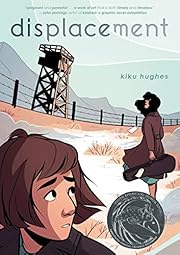

Click on a thumbnail to go to Google Books.
|
Loading... Displacementby Kiku Hughes

BookTok Teen (69) No current Talk conversations about this book.   ) )Displacement is a graphic novel about the internment of the Japanese in America during WWII. I have read 2 other comics on this subject and they all gave the same information. In this story our heroine Kiku is on vacation in San Francisco where her family is from. The displacements begin when she magically finds herself transported back to the 1940s when her grandmother Ernestina was forced to relocate to an internment camp. Living alongside her young grandmother and other Japanese-American citizens in internment camps, Kiku gets the education she never received in history class. She witnesses the lives of Japanese-Americans who were denied their civil liberties and suffered greatly, but managed to cultivate community and commit acts of resistance in order to survive. What separates this account of the tragedy from others is the illustration. I like that the comic strips were larger, with 4 to a page. It made the dialogue much larger for me to be able to read on a cell phone. When reading other comics on my phone, I have to enlarge the page in order to be able to read. Then I have to reduce the page in order to turn the page. Author Kiku Hughes drew all the illustrations. This is her first graphic novel and I am very impressed with both her ability to tell a story and her drawing skill. Hughes makes many insightful quotes in her book. One of them is: "I think sometimes a community's experience is so traumatic, it stays rooted in us even generations later. And the later generations continue to rediscover that experience, since it's still shaping us in ways we might not realize. Like losing the ability to speak Japanese, losing connection to Japanese culture, they're all lasting impacts of the camps that travel down the generations." I never realized before that the generation who suffered through the internment experience would raise their children to be American, not Japanese. They felt it would make successive generations safer from the government. They made sure their descendants did not know how to speak Japanese or cook Japanese food. It was a strategy that the entire generation followed. Displacement gives an honest history of the internment camps run by the U. S. government during WWII. While it is a sad story, it is one we all should know about. Hm, not sure how to rate! I actively disliked the time travel framing story and the passivity/contextlessness it causes until the explanation of why that framing story was used in part III. At that point it made more sense as an artistic choice at least. Maybe I need to read this a second time to get the full impact, then? I also saw that it was partly inspired by the Octavia Butler book which I haven't read yet; maybe that also provides some necessary artistic context that wasn't present in Displacement itself. no reviews | add a review
Was inspired byAwardsNotable Lists
"Kiku is on vacation in San Francisco when suddenly she finds herself displaced to the 1940s Japanese-American internment camp that her late grandmother, Ernestina, was forcibly relocated to during World War II. These displacements keep occurring until Kiku finds herself stuck back in time. Living alongside her young grandmother and other Japanese-American citizens in internment camps, Kiku gets the education she never received in history class. She witnesses the lives of Japanese-Americans who were denied their civil liberties and suffered greatly, but managed to cultivate community and commit acts of resistance in order to survive."--Publisher's website. No library descriptions found. |
Current DiscussionsNonePopular covers
 Google Books — Loading... Google Books — Loading...GenresMelvil Decimal System (DDC)741.5The arts Graphic arts and decorative arts Drawing & drawings Cartoons, Caricatures, ComicsLC ClassificationRatingAverage: (4.38) (4.38)
Is this you?Become a LibraryThing Author. |
||||||||||||||||||||||||||||||||||||||||||||||||||||||||||||||||||||||||||||||||||||||||||||||||||||||||||||||||||||||||